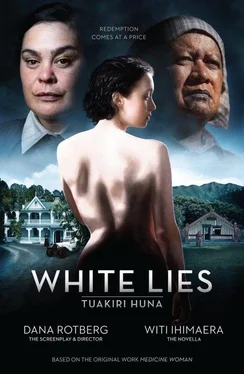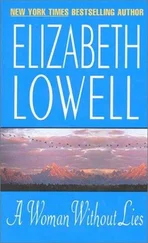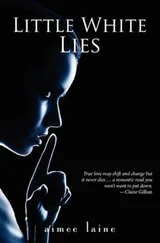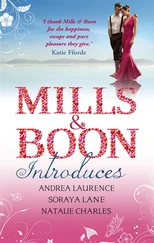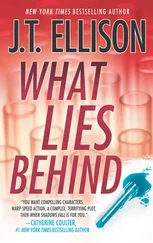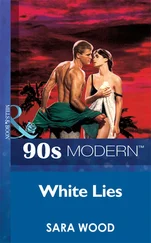Paraiti pulls Kaihe across the black river. Aue, motorised traffic is faster than an old woman with her horse, mule and pig dog, and a little girl riding the mule. It can come out of nowhere and is onto you before you know it. Now, roaring across the bridge like a ngangara, comes a huge sheep truck and trailer.
‘Quickly, Nan,’ Waiputa says. ‘We have to get to the other side of the road or we’ll be run over.’
Paraiti knows how fast she can go. Quick? She is already at quick. There’s nothing to do except face the ngangara.
‘E tu,’ she says to Ataahua and Kaihe. Together, they turn to the oncoming monster. Paraiti reaches for her rifle.
The truck driver signals to her to get off the road and then, alarmed, sees that she has raised a gun and is sighting it. He slams on the brakes: ‘Shit!’
The truck squeals to a halt, its trailer rattling, wheezing, collapsing before the old woman and her whangai daughter. The driver swears and starts to open the door to give the kuia a piece of his mind. When he sees the old, greying dog snarling and the little red-haired girl baring her teeth, he shuts it again, rapidly. ‘Stupid old woman,’ he yells at Paraiti as she goes past him. He waits until she has crossed the road before starting his truck and proceeding on his way.
Waiputa watches the truck disappearing down the road. She wags a finger at Paraiti. ‘Bad girl, Nan. We could have been killed.’
‘I know,’ Paraiti answers. ‘And I realise it was just a truck. But you know, in the old days, I would have shot it.’
Paraiti peers at the sun and begins to laugh and laugh. Then, looking at the road ahead, she pulls down her hat and says to Waiputa, Tiaki, Ataahua and Kaihe:
‘Looks like we’re just going to have to last forever.’
Notes and Original Novella

1. A SICKLY CHILD
I was my mother Julia’s first child. I was premature, a sickly baby with chronic breathing problems. According to her, the Pakeha obstetrician who delivered me didn’t think I would live beyond my first year.
This was in the early 1940s, and on her release from Gisborne maternity hospital my mother consulted her doctor, a kindly man named Dr Bowker, and when my breathing problems continued, took me to other Pakeha doctors without telling him. There was a certain amount of desperation about this: she always used to say to me, ‘I held you in my arms’, as if that explained everything.
My breathing problems continued into my third year. My mother bore a daughter, Kararaina, and then a son, Thomas, who died of a hole in the heart. I think this spurred her to finally turn to her own Maori community of faith healers, including a well-known tohunga, a Ringatu priest known as Hori Gage.
My mother always liked to be formally dressed whenever she went to see important people in the community, so she put on a dark blue suit, stockings, gloves and a hat and drove me to Mangatu, I think it was, where Hori Gage was said to be visiting. However, when she arrived she was told that he had already left to return to his own ancestral lands near Whakatane. She sank to her knees, cradling me in her arms. He had been her final hope.
I know all this because survival narratives are always central to any family, and my mother told them to me to try to instil in me the value of life. Although I was the eldest, compared with my brothers and sisters, I was the sickly runt of the bunch; I still am. And, of course, my mother had already lost Thomas and didn’t want to lose another son. I was prone to all the ills and sicknesses of the world, and the stories of my survival were dispensed with all the cod liver oil, malt and other less mentionable concoctions and therapies with which my mother plagued me with as a boy. My siblings did not think of this as special treatment; I made them look good.
Much later, it was intimated to me by another Maori seer that I would not live beyond the age of thirty, which seemed to affirm the doom and gloom with which my early life was surrounded. Of course I am over double that age now, so every year since I have considered a bonus.
My father’s approach to my sickliness was much more practical, if wrong. He has always been robust, refusing to believe in mollycoddling and instead favouring fresh air, open windows, cold baths and the like; when I grew older and still had various ailments he liked to threaten me with a health camp. I was therefore putty in his hands when he applied his own remedies to get me well, including one that was popular among Maori in those days: dabbing benzine on a cloth and getting me to inhale it. It’s a wonder I didn’t turn into a petrolhead.
So there she was, my mother, on her knees in the mud at Mangatu when she felt a gentle tap on her shoulders. ‘You should take your son to the medicine woman,’ a voice told her.
‘My informant was referring to a lady known as Paraiti,’ my mother told me, ‘or Blightface, because she had a red birthmark over the left half of her cheek running all the way from the hairline to the neck. Like Hori Gage, she was a Ringatu and a follower of the prophet Te Kooti’s spiritual ways.’
My mother therefore took this suggestion on its merits and straight away got up, bundled me into my blankets and drove the short way from Mangatu to Whatatutu, where Paraiti was going about her work. Among the stories of babyhood, this was the one that I could imagine fully: stars wheeling above, my anxious white-faced mother speeding down dusty roads looking for a scarred witch doctor, a crying baby in swaddling clothes — you know the sort of thing.
Where was my father? I don’t know; he never figured in the narrative.
This must have been around 1946, and the work of such women (and men) was illegal and frowned upon; I understood that Paraiti had been jailed a few times and she practised in a clandestine fashion. When my mother finally found her and delivered me to her for inspection, was Paraiti welcoming? No. First she intimidated my mother with her scar, and then scolded her by saying, ‘You should have come straight to me instead of going to Pakeha doctors. Why do you think I will be successful when they haven’t been?’
Paraiti must have been in her late seventies by then. She was a girl during the Land Wars and had lived through the flu epidemic of 1918. She had seen many changes as New Zealand became colonised. Grumpy though she was, she looked at me, said she would treat me and, from what Mum told me, for the next week kept me in a makeshift tent filled with herb-infused steam. Every now and then she trickled manuka honey down my throat.
‘Some days later,’ my mother told me, ‘Paraiti began to karakia, to pray, and, as she did so, she hooked a finger into your throat and pulled out threads of phlegm.’
2. HONOURING PARAITI
It is from this childhood survival story that I wrote White Lies , which was originally published as Medicine Woman in my 2007 collection, Ask the Posts of the House . In fact I had toyed with calling that collection ‘Medicine Woman’, but, at the last moment, chose the other title because it appeared to have more potency and gravitas.
Now comes the film directed by Mexican director Dana Rotberg. It will be the third feature film to be made from my work after Whale Rider in 2002 and Nights in the Gardens of Spain in 2010. (Known as Kawa for its American release in 2011, the latter film won a prestigious National Geographic indigenous award and was released in Germany with subtitles in 2012.) In both the novella of Medicine Woman and film of White Lies the name of Paraiti has been kept for the main character.
Читать дальше
